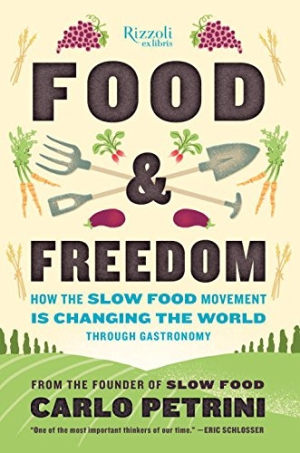Food and Freedom
How the Slow Food Movement Is Changing the World through Gastronomy
Petrini delves into contemporary agriculture problems to assert the importance of producing and consuming food that is good, clean, and fair.
Genetically modified foods. Monoculture hybrids. Global warming. Agrarian land reform. Loss of biodiversity. Chemical pollution. Maltreatment of illegal immigrants. The interconnections between all of these contemporary problems are examined in detail in Carlo Petrini’s Food and Freedom: How the Slow Food Movement is Changing the World Through Gastronomy.
Petrini founded the Slow Food phenomenon twenty years ago, motivated by the deadly methanol adulteration of Italian wines by a cabal of shameless producers. Petrini’s love of good food and drink is fueled not just by a gourmet palate; rather, he is a dynamo of social and environmental activism with a seemingly boundless appetite for tackling these huge problems in countries around the world.
This energetic tone percolates through this collection about the science of gastronomy, defined as a multidisciplinary study of ways to produce and promote high-quality foods in a way that sustains local people, cultures, and environments. Indeed, the chapters read more like speeches rife with passion, exhorting us to eliminate world hunger and malnutrition.
Petrini’s central message is that everyone who eats should only buy food that is good, clean, and fair. While most folks are hip to the first two tenets (and want inexpensive food to boot), many don’t worry whether their groceries have been made, distributed, or marketed with fair profits for or respectful treatment of farmers and other food producers. Without being didactic, the author vigorously stresses the importance of all three components in his discussion of food policy, as well as case studies from all over the globe.
Like the ideas he expounds upon, Petrini’s prose is dense and verges on the rococo, with long and looping sentences. Translator John Irving has done yeoman’s work in conveying the author’s meaning and zesty language, with a feast of footnotes explaining European political and cultural references.
Food and Freedom is a good introduction to the latest successes of the Slow Food movement, but it requires patient, stop-and-start tastings to fully understand the scope of current global food policies and markets.
Reviewed by
Rachel Jagareski
Disclosure: This article is not an endorsement, but a review. The publisher of this book provided free copies of the book to have their book reviewed by a professional reviewer. No fee was paid by the publisher for this review. Foreword Reviews only recommends books that we love. Foreword Magazine, Inc. is disclosing this in accordance with the Federal Trade Commission’s 16 CFR, Part 255.

